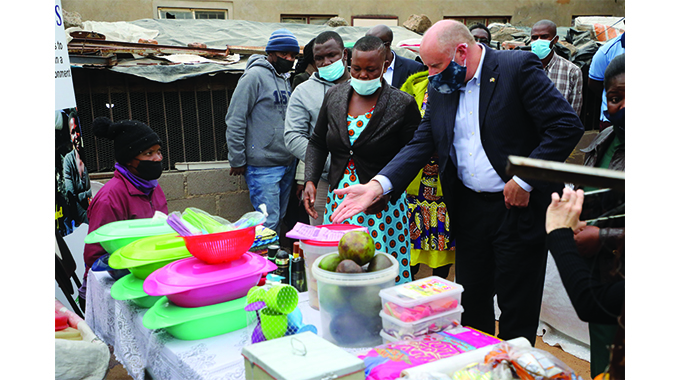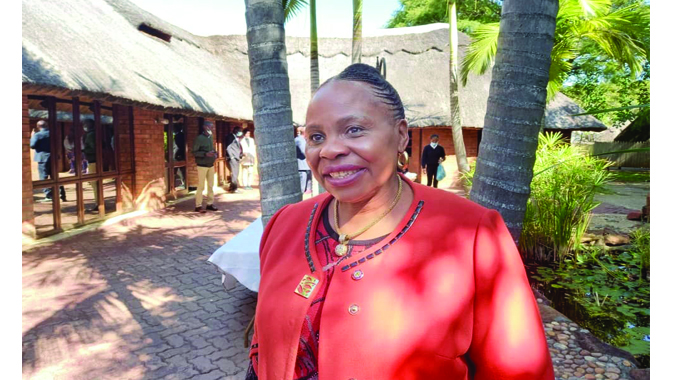Women empowerment projects charm US envoy

Lumbidzani Dima, Chronicle Reporter
BEING left by a husband who has always been a breadwinner either through death, divorce or separation may cause pain and long suffering.
In some instances it has resulted in single mothers failing to raise their children in the best way they wish.
A majority of widows and single mothers in Bulawayo have proved to be capable of taking good care of their children but their only challenge has been raising funds to start sustainable projects.
In a drive around Bulawayo on Monday, the Acting US Ambassador to Zimbabwe Thomas Hastings could not hide his amazement at how women and girls are utilising the President’s Emergency Plan For AIDS Relief (Pepfar) related programmes to overcome financial barriers and eke a decent living.
Pepfar was established in the US by former president George Bush in 2003 in an attempt to fight the HIV pandemic around the globe.
A group of women in Emakhandeni suburb are doing wonders with poultry and vending projects which have changed their lives for the better.

The chairlady of Phakamani group (comprising about 20 women), Mrs Mottilia Mutizwa commended the Savings and Internal Lending (SILC) scheme under Pepfar, for helping them gain recognition as widows and single mothers in society.
SILC is a holistic, savings-led micro-finance approach that provides a safe place for poor households to save and borrow to increase their income.
“These programmes have been a blessing; we don’t want to lie. Before the introduction of SILC, we were the poorest in the society. We used to take loans from ‘omashonisa’ (loan sharks) and we could not repay them. Gone are the days when we had to lock all doors and gates hiding from the sharks. Hunger, however, always eventually forced us to go out then we would bump into them, which was the worst nightmare.

Acting US Ambassador to Zimbabwe Thomas Hastings
“But when the programme came, they taught us about budgeting issues as well as investing money on a business that will keep on growing and generating more and more until we all become stable. Nowadays our ‘widowship’ is invisible. We are taking care of our kids very well and eating whatever we want. As ward 11 we are grateful for all this,” said Mrs Mutizwa.
She said they were now able to cater for school fees, stationery and uniforms without assistance.
Mrs Mutizwa said they started off with a floor polish making project, invested in broilers and moved to layers which they are still keeping and selling eggs.

Broilers
“We started with cobra, then realised that more people have tiled houses and competition was stiff. Then we proposed broiler keeping.
We started with 50 and trust me broilers gave us a lot money. We then moved to layers, we bought 125 layers then doubled the number to 250 as time went on. The layers used to give us five crates of eggs a day. This time we are getting 10 crates per day,” said Mrs Mutizwa.
The groups are also selling an assortment of stuff that includes jiggies, eggs, clothes, grass brooms, avocado’s and scones.
Mrs Mutizwa said at the end of last year, every member of their group managed to do something great for themselves, with others tiling houses while some were buying sofas and other property.
At Induba Primary School in Pelandaba, Gogo Lovie Mlilo said the lessons they got from the Sinovuyo Programme, another Pepfar offshoot, has helped in anger management issues.
“Under Sinovuyo we got to learn about good parenting and communication skills with our children. We have managed to control our anger. We have been made to understand our children better. This has been because our children are no longer scared of us, they can now freely talk to us,” she said.

Nketa High School
There was a tour at Nketa High School where there is a study club with 60 pupils, including children who are Dreams (Determined, Resilient, Empowered, Aids-free, Mentored and Safe) programme beneficiaries and a few others, getting to learn in a free atmosphere classroom where they can express themselves anyhow.
They attend the study club after their lessons of the day.
Dreams is an ambitious public-private partnership aimed at reducing rates of HIV among adolescent girls and young women (AGYW) in the highest HIV burden countries.
According to Acting Ambassador Hastings, in Zimbabwe about US$400 million has been spent on the programmes which started in 2021, meant to keep women and girls busy so that they are not vulnerable.

Money -Image taken from Shutterstock
“Pepfar has been in Zimbabwe for years now. The overall US assistance to Zimbabwe in 2021 was worth US$400 million which is actually the highest ever. The largest part of it is directed to the health sector. About UD$200 million deals with HIV issues, US$40 million for the Dreams programme and US$17 million for Orphans and Vulnerable children (OVC). We have many interests in Zimbabwe but health has been the real issue,” he said.
Acting Ambassador Hastings explained how the programmes which are not directly linked to HIV actually help fight the disease, to achieve the 2030 target.
“I was very honoured to visit a number of projects supported by the US government. All these are under Pepfar which is meant to fight HIV but I didn’t enter a single clinic or hospital which we provide a lot to. To address HIV issues, we introduced the Dreams programme meant for adolescent girls and young women, recognising that they remain very vulnerable especially if they are poor putting them at risk of contracting HIV. So, we work with them in terms of education and economic developmental projects where they are given funds to start businesses,” he said.
“All projects have nothing directly linked to HIV but they are very important in making sure that they are not vulnerable and they have the strength and resources to keep them safe.”










Comments